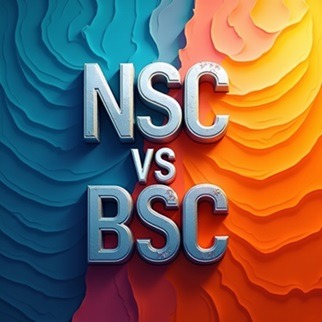NSC vs BSC: Main Differences, Advantages, and Which One to Utilize in 2025
Confused between NSC and BSC? Discover the key differences, benefits, and which stock exchange is better for you in 2025.
BSE NSE
Ayushi
7/28/2025


NSC vs BSC: The Indian stock exchange is a growing forum for both amateur and expert investors. Have you ever participated in a buy or sell of a stock? Then chances are that you have heard of two of the most well-known names: NSC (National Stock Exchange) and BSC (Bombay Stock Exchange). Both institutions are India's primary stock exchanges; however, what is the purpose of each? Furthermore, does it make a difference when selecting which exchange to trade on?
Let's clarify the situation in simple terms, thus allowing you to make better investment decisions in 2025 and beyond.
What are NSC and BSC?
Visualize NSC and BSC as two enormous bazaars where individuals go to trade shares of companies.
BSC (Bombay Stock Exchange) is the oldest stock exchange in Asia, established in 1875. It’s like the vintage model — rich in history, trusted, and time-tested.
Both the transactions are governed by SEBI (Securities and Exchange Board of India) to ensure legal and fair operations.
Why Are There Two Exchanges?
Great question! You could ask yourself — if they cover the same stocks and do the same work, why do they require two? Yes, more than one exchange promotes competition, innovation, and better services. While Flipkart and Amazon compete with one another for customers by making better offers, NSC and BSC compete to attract more companies and traders. This contest is in your favor, investor.
NSC vs BSC: Side-by-Side Comparison
Following is a basic comparison that explains their key differences:
1. Foundation:
NSC: established in the year 1992
BSC: Established in the year 1875, it is the oldest stock exchanger
2. Trade execution speed:
NSC: known for its fast trading speed
BSC: slightly slow in comparison
3. Market share:
NSC: nearly 90% share in derivatives market
BSC: more active in listing of SMEs
4. Number of listed companies:
NSC: more than 2000 companies
BSC: over 5000 companies, including many small and mid-caps
5.Liquidity:
NSC: More liquidity especially in large caps stocks
BSC: long historical investor base, popular for traditional investors
Nifty vs Sensex Understanding
Most investors typically get to hear Nifty and Sensex in market news. They are the benchmark indices of NSC and BSC.
Nifty 50: The top 50 companies listed on the NSC.
Sensex: Represents the largest 30 companies listed on the BSC.
Both indices give an indication of market performance. Nevertheless, let us not forget that they are only indicators. One can still invest in the same stocks through either exchange.
Clearing and Settlement: What It Means to You
When you place a trade, it's not just buying and selling. There is a back-end system that clears and settles your trade — moving money and shares in the right way.
NSC uses NSCCL (National Securities Clearing Corporation Ltd)
BSC uses ICCL (Indian Clearing Corporation Ltd)
Both are safe, robust, and SEBI-regulated. But NSCCL, with its high-tech and faster procedures, is overall considered more efficient — especially for high-volume trading.
Advantages of NSC to Investors
Faster Trade Execution
NSC's technology positions it well for intraday traders who rely on split-second decisions.
Increased Liquidity
It is simpler to locate a buyer or seller in a hurry, particularly for well-known and large-cap shares.
Increased reach in Derivatives
NSC holds the leadership position in F&O trading with a market share of almost 90%.
Reliable Pricing
Owing to increased volumes, the price discovery is more precise and reliable.
Advantages of BSC to Investors
1.Diversified Listings
BSE has more than 5,000 listed companies, and the majority of them are small-cap and mid-cap gems.
2.Historic Sensex Tracking
BSC's Sensex is a veteran benchmark with decades of experience, ideal for studying long-term trends.
3.BSC SME and Startup Platform
BSC is more proactive in listing small and medium-sized enterprises (SMEs), providing early access to growth companies to investors.
4.Fewer fluctuations (in some cases)
With fewer F&O transactions, BSC can be more relaxed, particularly for risk-averse investors.
Should one choose the NSC or the BSC?
It is worth mentioning that one does not always have to make a decision. Most important stocks are traded on both exchanges.
But here are some brief suggestions that fit your tone:
Intraday or F&O Trader: ideal choice is NSC
Long-term Investor: Either, respectively, by stock liquidity
SME/Startup Investor: BSC
Beginner Investor: NSC (because of tech + liquidity)
For most app investors such as Zerodha, Groww, or Upstox, your broker will typically route orders to the best exchange automatically for best execution and price.
Tip: Always Check Liquidity
Before you invest in any share, check where it's liquid (there are more buyers/sellers). Even if the share is listed on NSC and BSC, it may be actively traded on one of them.
Things like Moneycontrol, Screener.in, or even your own trading platform will indicate to you where the volume is greater.
The Shift to T+1 Settlement
India shifted to a T+1 settlement cycle in 2023-2024, i.e., settlement takes place the following day. Both NSC and BSC shifted to this.
This innovation is a valuable advantage to investors as it provides a faster access to money and shares, thereby making trading procedures smoother, safer, and more efficient.
Trends in 2025: What's New?
Both the exchanges are as of 2025:
Adopting AI-driven monitoring to avoid fraud
Enlarging international partnerships for cross-border listings Launching retail-friendly tools for better decision-making Promoting green finance and ESG-oriented corporations Thus, whether you choose to go for NSC or BSC, the investment future in India is bright.
Final Thoughts:
NSC or BSC? Both NSC and BSC are strong, reliable platforms that serve India's increasing investment ecosystem. You don't have to choose between them — but knowing how they compare enables you to make better decisions.
If you're a busy trader, then NSC's speed and volume might suit you better.
If you want new companies or SME shares, BSC can be more lucrative. Either method, remember:
The exchange is merely the means. Your true success is contingent upon your research, patience, and discipline.
A brief summary:
NSC: Quicker, more liquid, ideal for F&O and trading
BSC: More mature, wider listings,
which suit SMEs and risk-averse investors Most are listed on both, but liquidity is different Utilize credible websites and observe the volume before going into trades.
About Company


